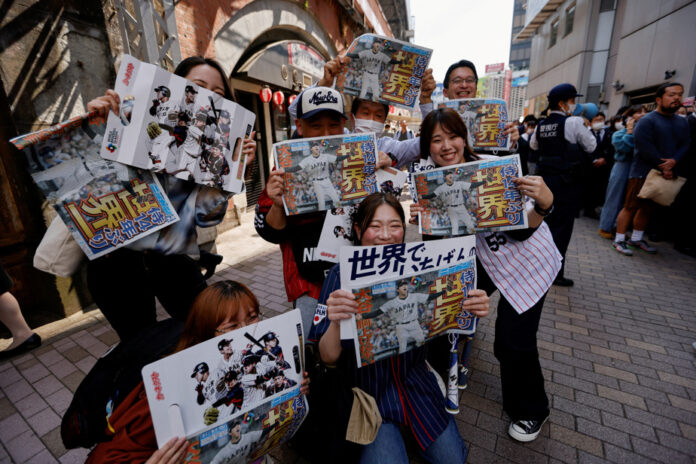(Tokyo) Japanese television stuck to its live coverage of Miami for nearly two hours following Japan’s 3-2 win over the United States in the World Baseball Classic Grand Final.
It was a show to watch over and over again.
The shot near the outside corner of home plate that allowed Shohei Ohtani to momentum retire Mike Trout, his Los Angeles Angels teammate, and end the game was featured on repeat replay, between player interviews, images of the locker room washed down with beer and the traditional ceremony where members of the winning team toss their manager and teammates into the air.
Yomiuri, the country’s main newspaper, published a special Wednesday afternoon edition for commuters, usually reserved for serious state affairs, breaking election news or, like last year, the assassination of former Prime Minister Shinzo Abe.
“Japan, number 1 in the world,” read the main headline, in Japanese, as commuters at Shibuya Station scrambled to grab the collectible.
Ohtani’s victory and focus over the past two weeks has served to distract from economic malaise, North Korea’s missile threats, China’s rise in Asia and its implications for Japan.
It also gave a boost to baseball in Japan, which is now rivaled by soccer as the country’s favorite sport. Japan is unlikely to win the World Cup in soccer in the short term, but the level of its baseball is world class. The country has won three of the Classic’s five titles since the first edition in 2006.
Japan joined the Dominican Republic in 2013 as the only undefeated champions of the main national team baseball tournament.
“I was comfortable losing or winning,” Hiroya Kuroda, 44, said in a crowd of around 400 people watching the match at a Tokyo Tower studio. “But I was very moved by the fact that they showed us a dramatic match on this stage in the United States. »
Toshiya Ishii, a 29-year-old fan, broke down in tears after the victory.
“Thank you Ohtani,” he said. “Congratulations to Samurai Japan. THANKS. »
Japan beat the Americans at their own game, and it wasn’t the first time.
American teachers and missionaries popularized the game in Japan in the 1870s and 1880s, but it was an 1896 game in Yokohama between Americans and Japanese, won 29-4 by Japan, that brought baseball to life. put down roots in the country.
“It’s the best decision I’ve ever made,” said Lars Nootbaar, the St. Louis Cardinals outfielder who was the first to play for Japan because of his background.
He spoke in a television interview after the game, then hugged his mother, Kumiko, who was standing by his side.
«Nippon daisuki», a dit Nootbaar en japonais. «Arigato».
(I love Japan. Thank you.)
Nootbaar, Ohtani, pitcher Yu Darvish and manager Hideki Kuriyama were among those tossed into the air by cheering teammates.
“It’s the first time I’ve been lifted like this,” Nootbaar said. “I hope I get a picture of it because it’s something I want to remember forever. »















